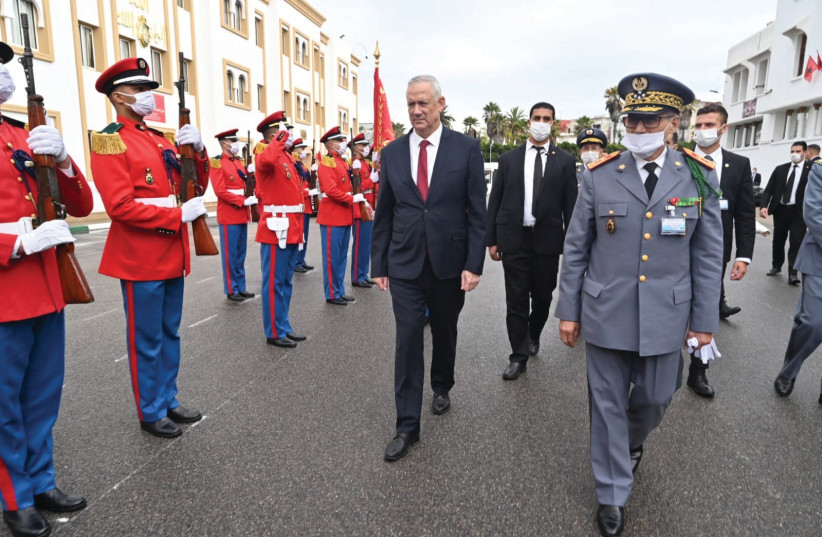Between the Algerian regime and the Kingdom of Morocco, chances are relations will not improve any time soon. Beyond the Sahara issue, each of the two countries entertain visions and philosophies of the world and of their respective futures that are poles apart. The last two speeches of King Mohammed VI recalled this stark reality that is hardly a secret, which led the Algerian propaganda machine to go berserk.
In his last Throne Speech, King Mohammed VI held the Algerian authorities accountable by calling for the revival of the Maghreb. The Moroccan and Algerian peoples dream of this regional union which, if it became a reality, would open up new prospects for young North Africans and would offer a broader field of action for trade and investment.
However, and much to the dismay of its population, which is mostly young, the Algerian junta remain adamantly against any overture to the world, while at the very same time, Morocco has made it the lever of its development and projection worldwide.
The reestablishment of Moroccan-Israeli relations, met with unrelenting Algerian attacks and hostility, is only one of the most recent illustrations of the huge gap separating the two north African countries.

Especially when Morocco and Israel have recently concluded important military agreements. These developments have shaken the Algerian regime which scandalously resorted into unbridled antisemitism attacks against Morocco. The Algerian junta, in yet another antisemitic fever, demanded that the Chief Rabbi of France Haïm Korsia not be included in the delegation accompanying the French President Emmanuel Macron during his trip to Algiers as revealed by the French magazine Le Point.
With such a vile spirit, Algerian intelligence services leave no stone unturned to demonize the Kingdom. They have even tried to damage the King's personal reputation. This will not work. Indeed their amateurish propaganda was massively denounced, through social networks, by Moroccans who took the opportunity to reiterate their firm attachment to the sovereign symbol of the nation and its unshakeable unity.
It comes as no surprise that such desperate attempts target King Mohammed VI, who is a reform-minded trailblazer known for his forward thinking. Morocco's development shakes the Algerian regime to its core, not least because the Algerian people see that there is a alternative to their plight.
While in other countries, the leaders are afraid of new ideas and the skills and talents of their expatriates, King Mohammed VI, has called upon Moroccans of the world, including Jews of Moroccan origin, to allow their country of origin to benefit from their know-how.
“Morocco, by the grace of the Almighty, has an expatriate community of about five million people, in addition to hundreds of thousands of Moroccan Jews around the world”, said the King in his last speech, adding that “Moroccans abroad are quite special in that they are deeply attached to the homeland and strongly committed to the nation's immutable values. They are also keen to serve their country's best interests, notwithstanding the problems and hardships they are facing”.
“The pivotal element in defending the Moroccanness of the Sahara is the unity of the domestic front and the full mobilization of all Moroccans - wherever they may be - to confront the plots of the enemies”, he went on, in his speech on August 20.
Moreover, King Mohammed VI sent out a “clear message to everyone: the Sahara issue is the lens through which Morocco looks at the world. It is the clear, simple benchmark whereby my country measures the sincerity of friendships and the efficiency of partnerships. He also called on certain countries, notably France without naming it, to be as clear as the major European countries are today on this issue, noting that the constructive position regarding the Autonomy Initiative adopted by a number of European countries – which include Germany, the Netherlands, Portugal, Serbia, Hungary, Cyprus and Romania - will contribute to ushering in a new era of trust-based relations, and will help strengthen the qualitative partnership with these friendly countries.”
In the same vein, the King said he values the position adopted by “our brothers in Africa; approximately 40% of African countries from five regional groups have opened consulates in Laayoune and Dakhla”.
It is not surprising that such speeches have a disconcerting effect on the enemies of the Kingdom of Morocco. Strongly believing in the virtues of unity, peace and openness, the Moroccan model irks those who seek to control and deprive their own people who legitimately aspire to prosperity and opportunity.
The writer is editor-in-chief of L’Observateur du Maroc.
